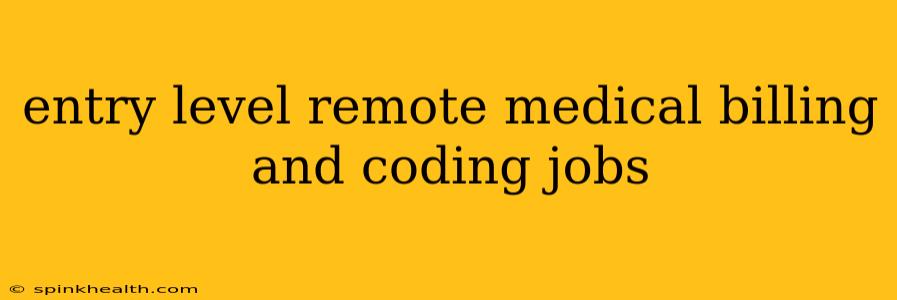The world of healthcare is vast, and within it lies a crucial, often unseen, role: medical billing and coding. It's a field brimming with opportunity, especially for those seeking the flexibility of remote work. But breaking into this industry as an entry-level candidate, working remotely, can feel like navigating a complex maze. This guide will illuminate the path, unraveling the mysteries and offering a roadmap to your dream remote medical billing and coding job.
What Does a Medical Biller and Coder Do?
Imagine being the translator between medical professionals and insurance companies. That’s essentially the job of a medical biller and coder. Medical coders translate diagnoses, procedures, and services into numerical codes using standardized systems like ICD-10 (for diagnoses) and CPT (for procedures). These codes are then used by medical billers to create and submit claims to insurance companies, ensuring healthcare providers receive accurate and timely payment. Think of it as a crucial link in the chain that keeps healthcare facilities running smoothly.
What Skills Do I Need for Entry-Level Remote Medical Billing and Coding Jobs?
While prior experience is often preferred, many employers are willing to train motivated individuals. Here’s what you should focus on:
- Strong attention to detail: Accuracy is paramount in medical billing and coding. One incorrect code can lead to delays or denials of payment.
- Computer proficiency: You'll be spending a significant amount of time working with billing software and electronic health records (EHRs).
- Understanding of medical terminology: Familiarity with common medical terms and procedures is vital for accurate coding.
- Excellent communication skills: You'll need to communicate effectively with both internal teams and external insurance companies.
- Problem-solving abilities: You’ll encounter challenges—denied claims, coding errors—requiring you to find solutions.
Pro Tip: Even before you land a job, start building your knowledge base. There are plenty of free online resources and courses available that can help you learn the basics of medical terminology, coding, and billing practices.
How Can I Find Entry-Level Remote Medical Billing and Coding Jobs?
The digital age is a boon for remote workers. Here are some avenues to explore:
- Job boards: Sites like Indeed, LinkedIn, Monster, and FlexJobs specialize in remote job postings. Use keywords like "remote medical billing," "work from home coder," and "virtual medical billing specialist."
- Company websites: Many healthcare companies—hospitals, clinics, and billing agencies—have their own career pages. Check the websites of organizations that interest you.
- Networking: Join online communities and forums for medical billing and coding professionals. Networking can lead to unexpected opportunities.
- Freelance platforms: Platforms like Upwork and Fiverr sometimes offer freelance medical billing and coding projects. This can be a good way to gain experience before seeking full-time employment.
What Certifications are Helpful?
While not always mandatory, certifications can significantly enhance your chances of landing a job and demonstrate your commitment to the field. Some popular certifications include:
- Certified Professional Coder (CPC): Offered by the American Academy of Professional Coders (AAPC).
- Certified Billing and Coding Specialist (CBCS): Offered by the National Healthcareer Association (NHA).
- Certified Medical Biller (CMB): Also offered by the NHA.
These certifications often require passing an exam, showing you possess the necessary knowledge and skills.
What is the Salary Range for Entry-Level Remote Medical Billing and Coding Jobs?
Salaries vary depending on location, experience, and certifications. However, entry-level remote medical billing and coding positions typically offer competitive pay, especially considering the flexibility of working remotely. Research average salaries in your area using online resources like Glassdoor or Salary.com.
How Can I Prepare for a Remote Medical Billing and Coding Interview?
Practice answering common interview questions, emphasizing your skills and how they align with the job requirements. Be ready to discuss your knowledge of medical terminology, coding systems, and billing procedures. Demonstrate your understanding of medical regulations and HIPAA compliance, vital in ensuring patient data security and privacy. Show your enthusiasm for the field and your eagerness to learn.
What are the Potential Challenges of Working Remotely in Medical Billing and Coding?
While remote work offers immense flexibility, be prepared for certain challenges:
- Maintaining a structured workday: It’s essential to create a dedicated workspace and maintain a consistent schedule.
- Staying connected: Strong internet connectivity is crucial for seamless work.
- Managing work-life balance: The lines between work and personal life can easily blur. Establish clear boundaries.
By planning ahead and implementing organizational strategies, you can successfully navigate these challenges.
Embarking on a career in remote medical billing and coding requires preparation, dedication, and a proactive approach. But with the right resources and mindset, you can unlock a fulfilling and rewarding career that offers both professional growth and work-life harmony. The code to your future is waiting to be cracked!

